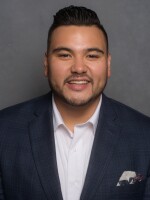The Arab Americans of Cleveland, a professional organization, received a grant this week to create an education program to help Cleveland’s Arab American communities better understand how local government functions.
On Tuesday, Neighborhood Connections, a Cleveland-based community building organization, provided the group a $5,000 Neighbor Up grant and awarded 65 more worth $254,297 for programs specific to Cleveland and East Cleveland, according to a media release.
Among the other projects to receive funding were Beetestants, which will hold a citywide spelling bee for students kindergarten through 8th grade in East Cleveland, and Food With Purpose, which will hold cooking and food education classes in Cleveland's Buckeye-Woodhill neighborhood.
Cuyahoga Arts and Culture, a local public arts and culture funder, provided $60,500 to help co-fund 19 of the projects.
Ideastream Public Media receives funding from Cuyahoga Arts and Culture. Ideastream was not one of the 19 organizations included in these grants.
Since 2003, Neighborhood Connections has made more than $15 million in grants to resident-led projects in Cleveland and East Cleveland, according to the group. Neighborhood Up grants are available several times a year to residents in Cuyahoga, Lake and Geauga counties to improve the quality of life in their neighborhoods.
“We are honored to support these groups and organizations doing amazing work in Cleveland and East Cleveland,” wrote Tom O’Brien, director of Neighborhood Connections, in a media release. “When a few people come together with good intentions and a plan, great things can happen. These organizations and groups are living examples of this belief.”
The Arab Americans of Cleveland said it will use the Neighbor Up funding to create an educational program to help teach the functions of the local government positions, encourage voter turnout and produce bilingual materials in a year Clevelanders vote for mayor and city council redraws ward boundaries.
“People don’t understand, for example, the difference between state house, state senate and U.S. House, U.S. Senate,” said Omar Kurdi, co-founder of Arab Americans of Cleveland. “How is the relationship and what does it mean between, for example, the mayor and his administration and city council.”
A language barrier and the perception that elected officials neglect the concerns of Arab Americans have caused some to disengage from local politics, Kurdi said.
“We’re constantly watching our people and our homelands make it on the news in very negative ways,” Kurdi said. “When you see that U.S. politicians broadly and the majority are not standing up or not voting for legislation that supports at least recognizes the pain of the community, I think the natural reaction would be to disengage.”
But that impulse towards disengagement is changing, he said.
Last month, voters in Dearborn, Michigan home to one of the country's largest Arab American populations, helped flip the state and its 15 electoral college votes for President-elect Donald Trump. For many in Dearborn, the war in Gaza played an important role in their votes, according to NPR.
“There is an increase in interest in how this civic process works,” said Kurdi, who added he hopes it will encourage more people to run for office. "The goal is to just make this information as accessible to the broader Arab American community."
Kurdi said the organization is also creating a data collection project to more accurately determine the size of Northeast Ohio’s Arab American population.
The size of Cleveland’s Arab American population is difficult to determine because “Arab” is not a designation counted on the U.S. Census, but Kurdi estimates about 60,000 Arab Americans live in Northeast Ohio with 4,000 in Cleveland alone.
“One vote matters when we talk about a council race,” Kurdi said. “I can only imagine when our community does show up to vote next year, what that could mean for the elections.”



